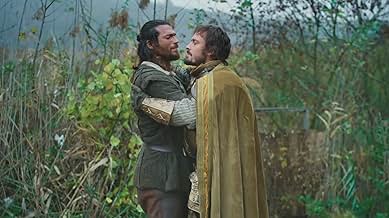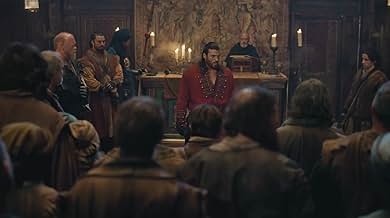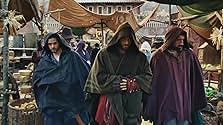Balaban, un soldato dell'esercito dei giannizzeri, va a vivere a Moena nel nord Italia dopo la battaglia di Vienna del 1683 e lotta per i diritti della gente locale.Balaban, un soldato dell'esercito dei giannizzeri, va a vivere a Moena nel nord Italia dopo la battaglia di Vienna del 1683 e lotta per i diritti della gente locale.Balaban, un soldato dell'esercito dei giannizzeri, va a vivere a Moena nel nord Italia dopo la battaglia di Vienna del 1683 e lotta per i diritti della gente locale.
Sfoglia gli episodi
Recensioni in evidenza
El Turco is more than just a period drama-it's a fascinating study of identity, displacement, and the burden of legacy, made all the more compelling by the casting of Can Yaman as Balaban. The most striking aspect of this series is not just its sweeping visuals or high-stakes narrative, but how the life of its lead actor seems to eerily echo the arc of the very character he portrays.
Balaban, a Janissary warrior presumed dead after the Siege of Vienna, finds himself in a foreign land, straddling cultures, loyalties, and identities. He becomes both an outsider and a savior-a bridge between East and West. Can Yaman's own journey, from a high-profile career in Turkish television to a controversial yet ambitious reinvention in Europe, mirrors this balancing act. Like Balaban, Yaman has had to navigate the expectations of his homeland while carving out a new identity abroad, often at great personal cost.
This resonance feels almost prophetic. Balaban is haunted by his past and driven by a vision of something greater than himself-much like Yaman, who has become a symbol of the modern Turkish star attempting to transcend national borders. In portraying a character who must reinvent himself in exile, Yaman effectively performs his own story. The sense of exile, of attempting to do good in a world that views you with suspicion, feels lived-in, not acted. It gives the performance an emotional heft that goes beyond script and direction.
There's a meta-layer to El Turco that can't be ignored. In many ways, the series feels like a dramatized prophecy of Can Yaman's real-life transformation-a tale of legacy, reinvention, and a search for belonging. It's that rare moment when life and art align, and the result is a performance that is not only convincing but eerily self-reflective.
El Turco becomes more than a historical drama-it becomes a mirror. And in that mirror, we see not just Balaban's struggle, but Can Yaman's own. The prophecy is not in the plot-it's in the casting. Makes you believe in divine intervention.
Balaban, a Janissary warrior presumed dead after the Siege of Vienna, finds himself in a foreign land, straddling cultures, loyalties, and identities. He becomes both an outsider and a savior-a bridge between East and West. Can Yaman's own journey, from a high-profile career in Turkish television to a controversial yet ambitious reinvention in Europe, mirrors this balancing act. Like Balaban, Yaman has had to navigate the expectations of his homeland while carving out a new identity abroad, often at great personal cost.
This resonance feels almost prophetic. Balaban is haunted by his past and driven by a vision of something greater than himself-much like Yaman, who has become a symbol of the modern Turkish star attempting to transcend national borders. In portraying a character who must reinvent himself in exile, Yaman effectively performs his own story. The sense of exile, of attempting to do good in a world that views you with suspicion, feels lived-in, not acted. It gives the performance an emotional heft that goes beyond script and direction.
There's a meta-layer to El Turco that can't be ignored. In many ways, the series feels like a dramatized prophecy of Can Yaman's real-life transformation-a tale of legacy, reinvention, and a search for belonging. It's that rare moment when life and art align, and the result is a performance that is not only convincing but eerily self-reflective.
El Turco becomes more than a historical drama-it becomes a mirror. And in that mirror, we see not just Balaban's struggle, but Can Yaman's own. The prophecy is not in the plot-it's in the casting. Makes you believe in divine intervention.
El Turco is a masterpiece. The plot is very interesting and very intriguing, it reveals real historical events by personal stories, fights between christians and muslis, between goods and evil. Scenography, costumes and soundtrack are amazing.
The actors have been chosen perfectly .The most impressive thing is a performance of Can Yaman as Hasan Balaban. He deserves many prizes and glory.
The action is very intensive, I couldn't stop watching El Turco until the end. I cried, was so excited and I needed a time to recover from these so strong emotions. I'm looking forward to for season 2 and recommend to everyone to watch ElTurco.
The actors have been chosen perfectly .The most impressive thing is a performance of Can Yaman as Hasan Balaban. He deserves many prizes and glory.
The action is very intensive, I couldn't stop watching El Turco until the end. I cried, was so excited and I needed a time to recover from these so strong emotions. I'm looking forward to for season 2 and recommend to everyone to watch ElTurco.
For those who have studied the historical epic of reference, it is truly like being transported there, between magic, superstitions, poverty, heroic impulses and divisions between castes and peoples. The Ottoman Empire of that presses at the gates of Catholic Europe. The characters are all well characterized, they have their own little-big story to tell.... Hasan Balaban, rejected and unjustly accused, finds courage to redeem himself and take his place among the righteous. Glory is his cure for the wounds of the body and, above all, of the soul two strangers, two lost souls who find, in each other, their own.
10ftonia
After watching the first episode one needs to go on watching and when the episodes end one needs more. I lijed everything of this series, the acting, the costumes, the historical background, the atmosphere...it's intriguing. It's historical but also a bit of a fairy tale with the eternal fight between good and evil. I liked all the actors but, since I have watched the previous series of Can Yaman, I must say that this series shows his growth as an actor and his multiple talents. He really worked a lot and learnt a lot for this role and one can see the good results of his committment. One special mention for Domenico Sica for the amazing scenography. Applause for Greta Ferro and all the cast.
A BEAUTIFULLY shot film, with a "continuous" plot. A mix of historical fiction and action! And I liked everything! It was a great project, and I watched it in one go. The cast is amazing. Well done, everyone. CAN is divinely talented, as always magnificent, brilliantly coped with the role of Hassan Balaban. Rating 10/10. I love all the movies with, CAN but he's amazing here! He plays in such a way that emotions go through the roof! Thanks to everyone who worked on the series! CAN Yaman! - Thank you for being here!!! Thanks to EVIE for showing "El Turko", WE ARE WAITING FOR SEASON 2 AND SANDOKAN! WE LOVE AND APPRECIATE!!
Lo sapevi?
- QuizThe series is inspired by the novel "El Turco - II. Viyana Kusatmasinin Bilinmeyen Yönleri" by Orhan Yeniaras. In the novel, the Ottoman intelligence officer Balaban Aga, who was found wounded during the Second Siege of Vienna and rescued by the people of Moena, settles in their village and organizes a successful peasant uprising against the overlords who overtaxed the people. This novel tells the extraordinary story of Balaban Aga, but also the unknown aspects of the Second Siege of Vienna.
- BlooperBalaban tells Topo the story about his family home and his father who took him to see the sultan. Later, Decebal tells Elda that the five of them, including Balaban, lived in the janissary barracks as orphans.
I più visti
Accedi per valutare e creare un elenco di titoli salvati per ottenere consigli personalizzati
Dettagli
- Tempo di esecuzione
- 45min
- Colore
- Proporzioni
- 16:9 HD
Contribuisci a questa pagina
Suggerisci una modifica o aggiungi i contenuti mancanti






















